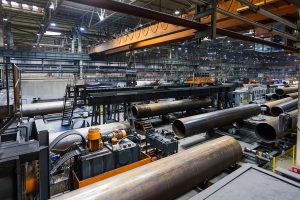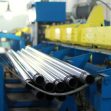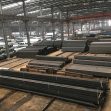The steel market still faces great uncertainty
The steel industry, a vital sector in the global economy, has been grappling with significant uncertainties in recent times. Despite being an essential component in various industries, including construction, manufacturing, and infrastructure development, the steel market has encountered numerous challenges that continue to impact its stability and growth. One of the primary factors contributing to the uncertainty in the steel market is the ongoing trade disputes among major economies. The imposition of tariffs and retaliatory measures on imports of welded steel pipe has disrupted the global supply chain and created an atmosphere of unpredictability. These trade tensions have led to market volatility, with fluctuating prices and sporadic demand patterns.

Moreover, the COVID-19 pandemic has further exacerbated the uncertainties in the steel market. The sudden halt in economic activities, lockdown measures, and supply chain disruptions have resulted in a decline in steel consumption. Industries that heavily rely on steel, such as automotive and construction, experienced significant setbacks, leading to reduced demand and surplus production capacity. Additionally, the emergence of alternative materials poses a challenge to the steel market. With increasing environmental concerns and the pursuit of sustainable practices, industries are exploring alternatives to hot rolled steel pipe, such as composite materials and lightweight alloys. These substitutes offer advantages in terms of weight, cost, and environmental impact, which may impact the future demand for steel.
Furthermore, the steel market is influenced by geopolitical factors, including political instability and regulatory changes. Shifts in government policies, such as changes in import-export regulations or the implementation of carbon emission targets, can significantly impact the steel industry’s operations and profitability. Uncertainty regarding policy decisions creates hurdles for long-term planning and investment in the sector.
To navigate the challenges and uncertainties in the steel market, industry stakeholders need to adopt proactive strategies. Collaboration among steel producers, governments, and industry associations is crucial to address common concerns and develop effective solutions. Additionally, investment in research and development is vital to enhance the competitiveness of steel products such as pre galvanized steel pipe, explore new applications, and improve environmental sustainability.
Moreover, diversification of the steel market can contribute to stability. Exploring new markets and expanding product portfolios can help mitigate the risks associated with overreliance on specific sectors or regions. By diversifying their customer base, steel producers can reduce their vulnerability to market fluctuations and enhance resilience. To navigate these challenges, collaboration, innovation, and diversification are crucial. By addressing these uncertainties head-on, the steel industry can strive for stability, growth of round steel pipe, and long-term sustainability in an ever-changing global landscape.
Tel: +86 18202256900 Email: steel@tjdpbd.com









